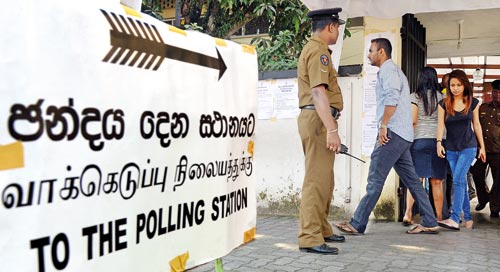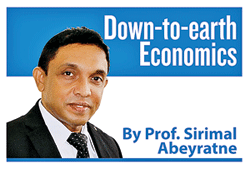Economy cornered with elections round the corner!
View(s):
File picture of an election polling centre in Sri Lanka.
Being a democracy,
Sri Lanka must have regular elections, while people used to enjoy them. Until the recent past, however, almost every year there has been some kind of an election somewhere in the country, if not the entire country.
For about three years now, the country didn’t have any election, which is quite unusual in the
Sri Lankan political setting. Provincial Council elections were delayed for about four years, while local government elections too have delayed for few months now. Many have now become increasingly impatient about the delays.
Sri Lanka is a democracy! But when we use the term “democracy”, we must also know its variations and the “boundary lines” that determine such variations. In some countries, the boundary lines are strict and enforced impartially so that the citizens know the limits to exercise their democratic rights. In some other countries, such boundary lines are loose and imposed in an ad hoc manner so that citizens can easily infringe others’ rights and freedom by exercising their own rights and freedom.
Timely issue
While the Sri Lankan economy is in a deep crisis, it has been just led out of the “Intensive Care Unit” only. Now it must follow a rigorous medication treatment in order to cure its chronic illness and to improve its strength and immunity. The economic recovery of getting back at least to the pre-pandemic level, may take many more years. It requires regaining people’s real incomes that was lost by more than half now.
However, as some continue to argue, the country should now get back to elections in order to uphold and uplift its democracy. For some, elections should come first, before addressing the country’s economic crisis. For others, it looks as if holding elections itself is the answer to the economic crisis. Moreover, for some others, answers to the crisis are clearly known to themselves so that the only thing they need is power to provide such answers.
Whatever it is, I am not arguing for or against any side here. I am interested in expounding the link between “politics and economics” in the Sri Lankan context. It is quite possible that next year 2024 is going to be an election year. It would be extremely interesting to see how such “elections amid crisis” determine the fate of the Sri Lankans in the coming years.
What more do we want?
During the past 35 years Sri Lanka has been conducting four types of frequent elections: Presidential elections, Parliamentary elections, Provincial Council elections and Local Government elections. Out of the four types, the country only had the Parliamentary and Local Government elections until 1977.
The Presidential election was added by the 1978 Constitution. Provincial Council elections were an outcome of the ethnic conflict with its roots in the Indo-Lanka Accord and the 13th Amendment to the Constitution in 1987.
 While Sri Lanka inherited its democratic political system of the Westminster type from the country’s colonial past, the British also granted universal suffrage as far back as 1931. To say the least, Britain had gained the universal suffrage only three years prior to that, while most of the other Asian countries received this democratic right much later than Sri Lanka.
While Sri Lanka inherited its democratic political system of the Westminster type from the country’s colonial past, the British also granted universal suffrage as far back as 1931. To say the least, Britain had gained the universal suffrage only three years prior to that, while most of the other Asian countries received this democratic right much later than Sri Lanka.
Along with thriving plantation crops – tea, rubber and coconut – the country had inherited a prosperous economy and higher welfare standards. In addition, the colonial government had invested in basic infrastructure, civil administration and judiciary as well as, while unlike in many other Asian countries finally, there was a “peaceful transfer of power” from the British to the locals.
After seeing all that, an American Economist, Donald Snodgrass who had published his research study on Sri Lanka at Yale University, questioned: “What more could a newly independent nation want?” Three decades after Independence, however, the economy was in a dire status with little changes in its plantation-dependent economy and with slower growth and increased unemployment.
More democratic, but…
While an Executive President came to power after 1978 with the objective of strengthening decision-making power and authority, structural changes were introduced to the other elections too. The former electorate-based election system was replaced with a district-based proportional election system. Accordingly, the candidates now compete not only with their rivals from other groups, but also with their own comrades in the list.
As a district is 4-5 times bigger than a former electorate, for an individual candidate carrying out an election campaign throughout a district is expensive. It paved the way for more external funding, more room for corruptions; after winning the elections, “returns to investment” in elections must be guaranteed. It’s also not surprising to see the deterioration of the quality of the polity, in which as one could argue, more competent and conversant politicians and potential candidates becoming cornered.
One could also argue that the new proportional representation is more democratic than the former, because it allows representatives from even smaller parties to get elected. However, it has distorted the fair balance between decision-making power and the degree of democracy.
Large ministerial portfolios
As a result of the same issue, governments have become more coalition-based further weakening the decision-making power and giving rise to disproportionately large Cabinets. As there is now an increased tendency for elections to give birth to coalition-based governments, in spite of strong demand attempts to reduce the size of Cabinets have become nightmares.
Large Cabinets mean a fragmented institutional mechanism. Today, we may find subject areas become disjointed and scattered, both horizontally and vertically among ministries, departments and statutory bodies. It has further weakened the decision-making power even in the case of critically important subject areas such as economy, education, infrastructure, agriculture, industry and environment due to issues of coordination, duplication and conflict.
In some cases, it has become difficult to understand “who is responsible for what?” leaving out a bulk of activities as no one’s responsibility. Eventually, when the polity becomes more democratic, it becomes a greater obstacle to development.
Sub-national representation
Elections at sub-national level are represented by the Provincial Council and Local Government elections, while the latter was inherited from colonial times, the former as a response to the ethnic conflict. Conceptually, decentralization of powers and authority is important in order to manage affairs locally and to promote regional development competitively. But practically, to what extent Sri Lanka has achieved this objective with its non-evolved, but super-imposed Provincial Council system is a source of a lengthy discussion.
What has been seen so far is that Sri Lanka’s sub-national level elections are not “sub-national” at all, but a representation of the same national political arm at provincial and local levels. For the major political parties, such elections are the testing ground and “barometers” for their political strength at the next national elections.
The divided local level has added another dimension to the confusion because it consists of 341 Local Government bodies elected locally and 345 District and Divisional Secretariats representing the local arm of national level. By territorial demarcation, they both are almost the same with similar numerical numbers.
Nevertheless, amalgamating the two sides to improve more-efficient and cost-effective local governance system with better coordination without conflicts is an unresolved issue. While the local government bodies also suffer from the same fate of qualitive issue, local administration is represented by a set of educated and trained civil administrators. It’s difficult to gather apples and oranges in one basket.
Competition and
compromise
The main issue that Sri Lanka has faced with in terms of its democratic traditions and development challenges is maintaining an uneasy balance between “authority and democracy”, because one over the other determines the decision-making power. Over the years and decades, we have realised that policies changed with the election cycles, reforms get diluted and not implemented, and long-term policies get slashed. Citizens were also illusioned by leaders whose competition for auctioning “unavailable” resources was of paramount importance at elections.
Although the economic crisis has provided an unprecedented opportunity for the citizens to rethink about the past, the same old political game is emerging again. Obviously, elections are around the corner, although we are in a deep crisis. We cannot blame anyone else for our fate.
(The writer is a former Professor of Economics at the University of Colombo and can be reached at sirimal@econ.cmb.ac.lk and follow on Twitter @SirimalAshoka).
Hitad.lk has you covered with quality used or brand new cars for sale that are budget friendly yet reliable! Now is the time to sell your old ride for something more attractive to today's modern automotive market demands. Browse through our selection of affordable options now on Hitad.lk before deciding on what will work best for you!


